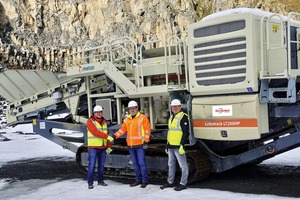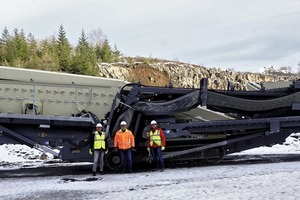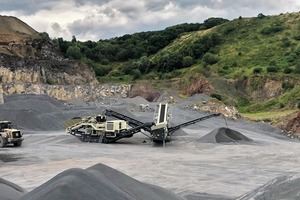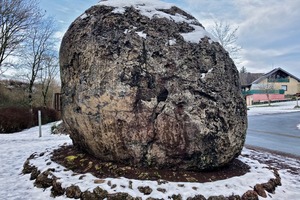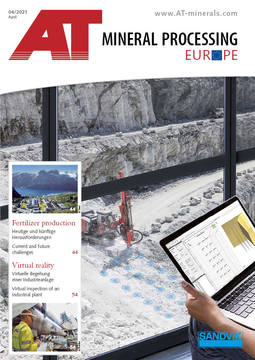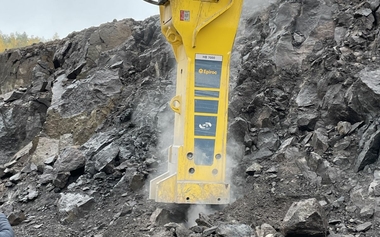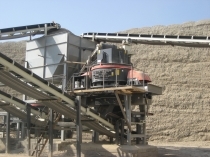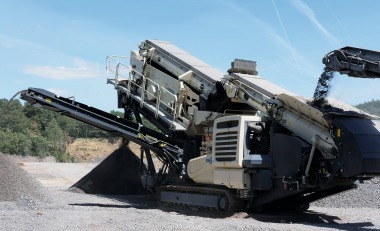Traditional company Scherer Baustoffe goes new ways
Not all lava is the same
Ernst Scherer Baustoffe GmbH & Co. KG has been located in Strohn in the Volcanic Eifel since 1956; the family business was founded as early as 1937. Bernard Douw is the plant manager of the regional basalt and lava works and is responsible for mining the material.
Douw explains why the application and thus also sales areas of the deposits can differ greatly depending on the location: “The different nature of the lava deposits plays a major role both in processing and in subsequent use. At our largest basalt and lava plant in Strohn, for example, we mine material of very different qualities because cooled lava flows from seven different eruptions run into each other there. As a result, the lava here is much more wear-intensive and literally “grinds” its way through our processing plants, as the air inclusions of the different layers leave sharp-edged fractures during crushing. The situation is quite different at our nearby Dreis-Brück plant: the lava rock mined there is lighter. It also does not require the usual drilling and blasting due to its fragile properties and is also significantly less abrasive. The final fractions, almost all of which have very fine grain sizes, are particularly suitable as aggregates for substrates, but are also used as fertilizers, water filters or insulation material.” In Strohn, where both basalt and lava are extracted, Bernard Douw notes a similar abrasiveness of both materials in processing. “While basalt crushes, lava literally eats through any plant.”
In general, a change can be observed in the lava/basalt mining industry. According to Scherer’s own information, a few years ago the company produced significantly more products for road construction – a share that is now visibly shrinking and causing the production volume to decline. This is particularly the case because roadways in the region are no longer completely replaced, but at best their surfaces are rehabilitated in order to save costs. Although the frost protection materials (0/32 and 0/45 mm) for road construction are still the main product of the plant in Strohn, the trend of the basalt precious chippings is increasingly moving into other areas, such as the production of precast concrete elements. Other areas of application for lava include green roof projects, substrate and brick manufacturing.
“Due to the decline in road construction repairs, we are supplying other markets in the future. Theoretically, we could produce significantly more tons per year at the basalt/lava plant in Strohn, for example, but the market has not allowed for this for some time,” explains Douw. “On the other hand, when demand for the finest high-grade chippings (0/2, 2/5 and 5/8 mm) increased, we recognized the need for secondary crushing of the oversize or larger fractions (8 – 22 mm) that had accumulated. Last summer, we turned to Ralph Phlippen from Fischer-Jung Aufbereitungstechnik in Krefeld, who supported us quickly and without complications by providing a suitable mobile crusher for the 4th crushing stage and a matching mobile screening machine.”
Always on the move as a well-coordinated team
In the end, the company’s decision was permanently in favor of a Metso:Outotec Lokotrack LT200HP secondary/tertiary crusher, which, as a compact and track-mounted solution with direct drive and IC600 process control, can be flexibly deployed at one of the company’s eight mining sites in the Volcanic Eifel. The cone crusher is one of Metso:Outotec’s best-selling models and has proven most effective for fine crushing in the lava/basalt quarries, according to Scherer. A track-mounted Metso:Outotec Nordtrack S4.9 screening machine was chosen for classification, which, in addition to its high operational flexibility, also has three screening decks. The upper and middle decks are generously sized, each measuring 6100 x 1524 mm, to allow effective classification of large quantities of abrasive rock when required. The lower deck is only slightly smaller.
“In our opinion, the two plants from Fischer-Jung Aufbereitungstechnik are a well-coordinated team. The crusher produces a distinct cubic grain, which is definitely a quality and sales feature for us. In addition, we have already moved both plants four times since we bought them, so the decision to rely on mobile machines has paid off completely,” says plant manager Douw. The mobile plants currently shuttle between the Strohn, Mayen and Üdersdorf sites. “Whether it’s basalt or lava, we’re certainly not embarrassed in terms of process technology.”
Fischer-Jung Aufbereitungstechnik has been helpful to the company since commissioning in the summer of 2020: “At first, we assumed that we would only use the two plants for a while. However, we were then immediately convinced by the quality of the grain shape, the 80 – 120 t/h and the cooperation. To give just one example: With the support of Fischer-Jung, we spontaneously replaced the standard square mesh screen linings at Nordtrack with self-cleaning stainless steel screen linings. Since then, weather-induced caking or plugged grain have no longer put a spanner in the works of our production,” explains Bernard Douw.

